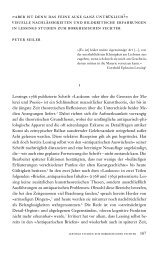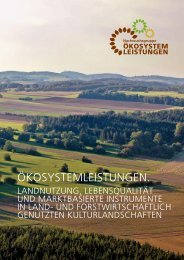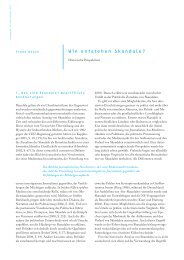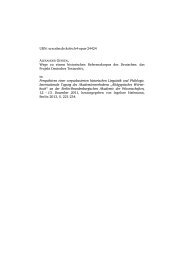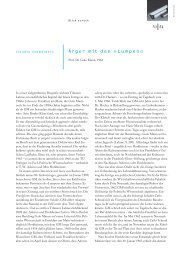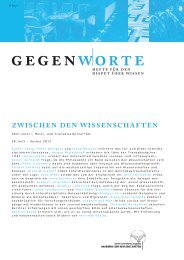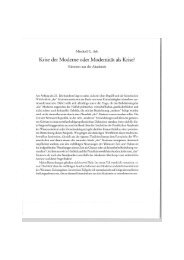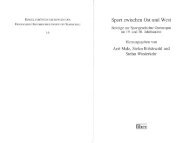- Seite 1 und 2:
BERLIN-BRANDENBURGISCHE AKADEMIE DE
- Seite 4 und 5:
BERLIN-BRANDENBURGISCHE AKADEMIE DE
- Seite 6 und 7:
Inhalt Organe, Gremien und Einricht
- Seite 8 und 9:
Interdisziplinäre Arbeitsgruppen,
- Seite 10:
Ernst Mayr Lecture 2009 Paul Schmid
- Seite 14 und 15:
Vorstand Präsident Günter Stock V
- Seite 16 und 17:
Mitarbeitervertretungen Sprecher/in
- Seite 18 und 19:
Mitglieder ([…] Jahr der Zuwahl)
- Seite 20 und 21:
scha� en, Friedrich-Meinecke-Inst
- Seite 22 und 23:
Jägerstraße 22/23, 10117 Berlin,
- Seite 24 und 25:
Nida-Rümelin, Julian, Prof. Dr. ph
- Seite 26 und 27:
Fax: 030/20 37 03 44, e-mail: selge
- Seite 28 und 29:
Gra� on, Anthony, Prof. Dr., geb.
- Seite 30 und 31:
Sti� ung WHU; dienstlich: Wissens
- Seite 32 und 33:
e-mail: carl-ludwig.holtfrerich@ fu
- Seite 34 und 35:
enkler@sowi.hu-berlin.de, Internet:
- Seite 36 und 37:
Finanzwirtscha� , insbesondere Ba
- Seite 38 und 39:
(CIQLE), 140 Prospect Street, New H
- Seite 40 und 41:
für Informationstechnik Berlin, Ta
- Seite 42 und 43:
Hasinger, Günther, Prof. Dr., geb.
- Seite 44 und 45:
München, Tel.: 0 89/91 29 90, Fax:
- Seite 46 und 47:
tik, Ernst-Abbe-Platz 2, 07743 Jena
- Seite 48 und 49:
Parrinello, Michele, Prof. Dr. Dr.
- Seite 50 und 51:
ger Allee 160, 23538 Lübeck, Tel.:
- Seite 52 und 53:
wald, Institut für Mikrobiologie,
- Seite 54 und 55:
nik für Psychiatrie und Psychother
- Seite 56 und 57:
frankfurt.mpg.de/global/np/staff /s
- Seite 58 und 59:
Gerok, Wolfgang, Prof. Dr. med. Dr.
- Seite 60 und 61:
Technikwissenschaftliche Klasse Ord
- Seite 62 und 63:
†*Giloi, Wolfgang, Prof. Dr. Dr.
- Seite 64 und 65:
Verfahrenstechnik; dienstlich: Leib
- Seite 66 und 67:
*Stephan, Karl, Prof. Dr.-Ing. E. h
- Seite 68:
e-mail: praesidentin@landtag.thueri
- Seite 71 und 72:
ter an der Technischen Universität
- Seite 73 und 74:
Prof. Dr.-Ing. habil. Dietmar Ei�
- Seite 75 und 76:
Prof. Dr. Ute Frevert geb. am 10. J
- Seite 77 und 78:
Prof. Dr. Martin von Koppenfels geb
- Seite 79 und 80:
Prof. Ph.D. Axel Meyer geb. am 4. A
- Seite 81 und 82:
� e end of the code: Hox14 expres
- Seite 83 und 84:
Establishment of memory for IL-10 e
- Seite 85 und 86:
Mittelalter bis zur Französischen
- Seite 87 und 88:
seit 2004 Mitglied der Kommission d
- Seite 89 und 90:
Mitgliedscha� en und Ehrungen (Au
- Seite 91 und 92:
tion: the Mediterranean, Central As
- Seite 93 und 94:
Er ist dann (1960) bei AEG-Telefunk
- Seite 95 und 96:
Rat 94 | Rat Der Rat bildet die ins
- Seite 97 und 98:
Koordinierungsgremium der Nationale
- Seite 99 und 100:
Arbeitsstelle Corpus Inscriptionum
- Seite 101 und 102:
Arbeitsstelle Berliner Klassik Proj
- Seite 103 und 104:
Arbeitsstelle Goethe-Wörterbuch (B
- Seite 105 und 106:
cho, Prof. Dr. Geert Keil (Aachen),
- Seite 107 und 108:
Interdisziplinäre Arbeitsgruppe Ex
- Seite 109 und 110:
Ansprechpartner: Prof. Dr. Carl Fri
- Seite 111 und 112:
Projekte und Initiativen Nachwuchsg
- Seite 113 und 114:
Telefon: 0 30/20 37 03 90, Fax: 0 3
- Seite 115 und 116:
Gegenworte - Hefte für den Disput
- Seite 117 und 118:
Beiräte und Kommissionen zur Betre
- Seite 119 und 120:
Arbeitsstelle Leibniz-Edition Berli
- Seite 121 und 122:
Kommission Martin-Buber-Werkausgabe
- Seite 123 und 124:
Ständige Kommissionen Haushaltskom
- Seite 125 und 126:
Medaillen und Preise Die Akademie v
- Seite 127 und 128:
lin-Brandenburgischen Akademie der
- Seite 129 und 130:
Hermann und Elise geborene Heckmann
- Seite 131 und 132:
Kooperationen, Trägerschaften und
- Seite 133 und 134:
Frage „Wer kriegt die Krise?“ D
- Seite 135 und 136:
ereiche zu erörtern, bildet der Ra
- Seite 137 und 138:
Forschungsstelle der Arnold Schönb
- Seite 139 und 140:
Im Winter 2010 lädt das Forum zu e
- Seite 142 und 143:
Grußansprache des Präsidenten Gü
- Seite 144 und 145:
lis:sanga kommt aus dem Kongolesisc
- Seite 146 und 147:
Haushaltssituation werden wir in de
- Seite 148 und 149:
aussetzungen dafür schuf, dass sic
- Seite 150 und 151:
Dankesrede von Manfred Erhardt Herr
- Seite 152 und 153:
Integrabilität als Ordnung im Klei
- Seite 154 und 155:
Ansprache anlässlich der Verleihun
- Seite 156 und 157:
licher Artikel, der übrigens auch
- Seite 158 und 159:
Abbildung 4 Poster der Konferenz zu
- Seite 160 und 161:
Um diese Frage zu beantworten, müs
- Seite 162 und 163:
lichkeit gehen, also nicht mehr um
- Seite 164 und 165:
dem Jahre 1785 ausgedrückt, „das
- Seite 166 und 167:
europäischen Gedankens. Von einer
- Seite 168 und 169:
darstellen, wenn demnächst wieder
- Seite 170 und 171:
texten, der prägenden Textform im
- Seite 172 und 173:
Arbeitsweise verabschiedet wurden.
- Seite 174 und 175:
Abbildung 1 Lapidarium im Kastro vo
- Seite 176 und 177:
liche Dokumente zugänglich zu mach
- Seite 178 und 179:
Abbildung 5 und 6 Medaille und Urku
- Seite 180 und 181:
Abbildung 9 Blick in das Magazin de
- Seite 182 und 183:
Abbildung 12 Aloys Hirt (1759-1837)
- Seite 184 und 185:
Abbildung 14 Akademiegebäude nach
- Seite 186 und 187:
Die Künstler der Festsitzung Die l
- Seite 188:
Einsteintag Festsitzung am 13. Nove
- Seite 191 und 192:
darf, als „Berliner“ wie als
- Seite 193 und 194:
Das Jahresthema hat sich überdies
- Seite 195 und 196:
Grußwort des Staatssekretärs im M
- Seite 197 und 198:
Ihre Beschä� igung mit dem „Gl
- Seite 199 und 200:
Vorstellung der neuen Mitglieder de
- Seite 201 und 202:
Universität Essen und bereits weni
- Seite 203 und 204:
Biowissenscha� lichen-medizinisch
- Seite 205 und 206:
Abbildung 2 Links ein Ausschnitt au
- Seite 207 und 208:
Abbildung 3 Simulation der großrä
- Seite 209 und 210:
Dass es überhaupt Kohlenstoff gibt
- Seite 211 und 212:
Mond bilden konnte. Der Mond wieder
- Seite 213 und 214:
Verleihung des Potsdamer Nachwuchsw
- Seite 215 und 216:
Laudatio auf Hauke Marquardt ROLF E
- Seite 217 und 218:
überhaupt gelungen, Brillouin-Mess
- Seite 219 und 220:
den komplexen Lebenszyklus des Mala
- Seite 221 und 222:
Bénédicte Savoy (Jahrgang 1972) s
- Seite 223 und 224:
Verleihung des Liselotte Richter-Pr
- Seite 225 und 226:
von William Byrd und Johann Sebasti
- Seite 228 und 229:
Aus der Arbeit der Versammlung RENA
- Seite 230 und 231:
lung nahm die Vergabe des Förderpr
- Seite 232 und 233:
Aus der Arbeit des Rates RENATE NIC
- Seite 234 und 235:
wissenscha� lichen Kooperation mi
- Seite 236 und 237:
Aus der Arbeit der Klassen RENATE N
- Seite 238 und 239:
15. Oktober Geisteswissenscha� li
- Seite 240 und 241:
genden � emen. Sie aktivierten we
- Seite 242 und 243:
jektevaluation positiv verlaufen un
- Seite 244 und 245:
ten Forschungsleistungen umfassend,
- Seite 246 und 247:
Sammlung, für dessen Überlassung
- Seite 248 und 249:
Zentren Kommission Zentrum Grundlag
- Seite 250 und 251:
Kommission Zentrum Preußen - Berli
- Seite 252 und 253:
digen Kommission statt. Neben der k
- Seite 254 und 255:
Kunstgeschichte verschiedene Aspekt
- Seite 256 und 257:
tersuchen. Das zentrale Anliegen de
- Seite 258 und 259:
Die Arbeiten von Telota konzentrier
- Seite 260 und 261:
in den Bereichen Umwelt- und Artens
- Seite 262 und 263:
gabenbereich an der Akademie instit
- Seite 264 und 265:
Comparison. Leverkusen-Opladen: Ver
- Seite 266 und 267:
- IAG Humanprojekt: Workshop „Koe
- Seite 268 und 269:
laren Genetik in der Arbeitsgruppe
- Seite 270 und 271:
de Partner gleichermaßen ein berei
- Seite 272 und 273:
In dieser Absicht wurde im Jahr 200
- Seite 274 und 275:
dem „Institut für Biomedizinisch
- Seite 276 und 277: Anthropologie sowie die Auseinander
- Seite 278 und 279: Für die Projektarbeit und Koordina
- Seite 280 und 281: - „Planungs- und Steuerungsinstru
- Seite 282 und 283: lesungen je eine durch jedes Cluste
- Seite 284 und 285: engagiert sind, zu diskutieren, um
- Seite 286 und 287: Interdisziplinäre Arbeitsgruppe Zu
- Seite 288 und 289: Perspektive zur Erforschung individ
- Seite 290 und 291: etont. In Deutschland stehen hingeg
- Seite 292 und 293: perspektive wurde in der Renaissanc
- Seite 294 und 295: logien“. Durch die Kooperation wu
- Seite 296 und 297: vorbereitet werden soll. Im Mai 201
- Seite 298 und 299: ichten sich zunächst an die einsch
- Seite 300 und 301: Interdisziplinäre Arbeitsgruppe Zu
- Seite 302 und 303: stein (Max-Planck-Institut für dem
- Seite 304 und 305: Projekte und Initiativen Koordinier
- Seite 306 und 307: ten Menschen ist diese Technologie
- Seite 308 und 309: Für eine neue Politik in der Grün
- Seite 310 und 311: sehr selten der Fall. Seit einigen
- Seite 312 und 313: Vorträge (Auswahl) Gerdes, Holger:
- Seite 314 und 315: Bericht über die Arbeitsergebnisse
- Seite 316 und 317: Arbeiten würde den hiesigen Rahmen
- Seite 318 und 319: - Walkowski, Niels-Oliver: Zur elek
- Seite 320 und 321: haltung des PDR bilden wird. Da die
- Seite 322 und 323: Bericht über die Arbeitsergebnisse
- Seite 324 und 325: mit Textarchiven“, Berlin-Branden
- Seite 328 und 329: on in the knowledge base. Once cons
- Seite 330 und 331: Deliverables available as Technical
- Seite 332 und 333: Zum anderen sollte aus der Arbeit h
- Seite 334 und 335: - Wissenscha� liche Aktivitäten
- Seite 336 und 337: Vom 8. bis zum 10. Juli 2009 fand d
- Seite 338 und 339: Ökonomie zu Gebote stehenden metho
- Seite 340 und 341: des Alten Reiches mit der Erfassung
- Seite 342 und 343: Öff entlichkeitsarbeit Die Mitarbe
- Seite 344 und 345: schnitten wurden die in der islamis
- Seite 346 und 347: Im Rahmen von Arbeitsgesprächen am
- Seite 348 und 349: Vorträge und Veranstaltungen Gurtm
- Seite 350 und 351: Ders.: „Die Entstehungsgeschichte
- Seite 352 und 353: CIL XVIII/2: Lateinische Versinschr
- Seite 354 und 355: Publikationen Campedelli, Camilla:
- Seite 356 und 357: Im Rahmen einer Kooperation mit dem
- Seite 358 und 359: Wissenschaftliche Vorträge Brockma
- Seite 360 und 361: Die Griechischen Christlichen Schri
- Seite 362 und 363: Marietheres Döhler wird die Actus
- Seite 364 und 365: Risch, Franz Xaver: [Rez.]:Halfwass
- Seite 366 und 367: te Corpus de� xionum und die Erfa
- Seite 368 und 369: auch von der BBAW großzügig unter
- Seite 370 und 371: Stand der monographischen Editionen
- Seite 372 und 373: haben. Die Schwedische Akademie der
- Seite 374 und 375: honour of the 80th birthday of Prof
- Seite 376 und 377:
Ders.: „A Uigur Chan text”. Dun
- Seite 378 und 379:
Ingo Schwarz ergänzte die Chronolo
- Seite 380 und 381:
Ders.: „Alexandre de Humboldt, sa
- Seite 382 und 383:
Ders.: Carus und Alexander von Humb
- Seite 384 und 385:
Im „Montagsklub“ (organisiert u
- Seite 386 und 387:
Dies.: „Ich bin ein gebohrner Pre
- Seite 388 und 389:
Gelehrte und Ungelehrte. Online-Edi
- Seite 390 und 391:
heiten. Als Kernpunkt kristallisier
- Seite 392 und 393:
Anthologien Holtz, Bärbel/Neugebau
- Seite 394 und 395:
Schleiermacher: Kritische Gesamtaus
- Seite 396 und 397:
Kirchengeschichte“. International
- Seite 398 und 399:
Ders.: Linguistik und Philologie: S
- Seite 400 und 401:
Publikationen Deutsches Wörterbuch
- Seite 402 und 403:
Überführung des Wörterbuchs der
- Seite 404 und 405:
Abbildung: Auszug aus http://dwds.d
- Seite 406 und 407:
Geyken, Alexander/Schrader, Norbert
- Seite 408 und 409:
Publikationen Goethe-Wörterbuch. 5
- Seite 410 und 411:
gedruckt 1480); Neueingabe der Cens
- Seite 412 und 413:
Technische Weiterentwicklung der Da
- Seite 414 und 415:
Wort- und Namenregister wird bis zu
- Seite 416 und 417:
Ders.: Eine Kiste voller Knochen -
- Seite 418 und 419:
Brandenburg wurde der Ritter-Katalo
- Seite 420 und 421:
sident des Niedersächsischen Landt
- Seite 422 und 423:
Leibniz-Edition Berlin Im Berichtsz
- Seite 424 und 425:
Das Interesse an der Interneteditio
- Seite 426 und 427:
Lehre Hecht, Hartmut: Humboldt-Univ
- Seite 428 und 429:
chenden Institutionen weitergeführ
- Seite 430 und 431:
Aufsätze, Berichte Bentzinger, Rud
- Seite 432 und 433:
Grundriss zur Geschichte der deutsc
- Seite 434 und 435:
ordentlich weit gediehen ist auch d
- Seite 436 und 437:
estehen bleibt, wurde als nächster
- Seite 438 und 439:
Originaldruckschri� en. Das Glied
- Seite 440 und 441:
Kommission Martin-Buber-Werkausgabe
- Seite 442 und 443:
der Internationalen Arbeiterassozia
- Seite 444 und 445:
Publikationen Marx, Karl/Engels, Fr
- Seite 446 und 447:
Mittelalter-Kommission BERICHT MICH
- Seite 448 und 449:
Publikationen Bednarz, Ute/Martin,
- Seite 450 und 451:
Ulrike/Lawo, Mathias/Lindner, Micha
- Seite 452 und 453:
Das Akademiearchiv VERA ENKE Im Jah
- Seite 454 und 455:
zember 2009 anlässlich des 600jäh
- Seite 456 und 457:
dem eigenen Bibliotheksbestand erf
- Seite 458 und 459:
Informationstechnologie (IT) GERALD
- Seite 460 und 461:
Sicherheit Ein wichtiges � ema is
- Seite 462 und 463:
Internationale Beziehungen KARIN EL
- Seite 464 und 465:
aktiv genutzt werden sollten. Darü
- Seite 466 und 467:
die Konferenz am 28. Mai 2009 an de
- Seite 468 und 469:
Chung. Das deutsch-koreanische Symp
- Seite 470 und 471:
ihrer Editionsarbeiten informierten
- Seite 472 und 473:
Im Berichtsjahr 2008 hatte die Inte
- Seite 474 und 475:
gegenzutreten. Gemeinsam mit Franç
- Seite 476 und 477:
nahmen vom 19. bis 30. Oktober 2009
- Seite 478 und 479:
Im Rahmen der wissenscha� lichen
- Seite 480 und 481:
der BBAW durch das Akademienvorhabe
- Seite 482 und 483:
Gegenworte - Hefte für den Disput
- Seite 484 und 485:
Im Jahr 2009 gab es in der Redaktio
- Seite 486 und 487:
Schuljahr 2009/2010 in die neunte R
- Seite 488 und 489:
die Einbeziehung außerschulischer
- Seite 490 und 491:
Rudolf (Hg.), Schule forscht. Ansä
- Seite 492 und 493:
Angela Winkler sowie mit den Akadem
- Seite 494 und 495:
Pittsburgh), auf Einladung des Zent
- Seite 496 und 497:
Vortragsreihen und Veranstaltungen
- Seite 498 und 499:
wein umrahmten die Veranstaltung mi
- Seite 500 und 501:
umgestaltet. David Blackbourn schil
- Seite 502 und 503:
Über diese Fragen diskutierten äu
- Seite 504 und 505:
Teilnehmer: Wolf-Dieter Ludwig, Vor
- Seite 506:
nach ‚du� iger Ferne’ und der
- Seite 510 und 511:
Introduction PAUL SCHMID-HEMPEL Mei
- Seite 512 und 513:
over what actually is the unit of s
- Seite 514 und 515:
The ‘Spirit of the Hive’ and Ho
- Seite 516 und 517:
and till we attempt to locate it, w
- Seite 518 und 519:
Figure 2 A natural swarm of honey b
- Seite 520 und 521:
an organizational structure that is
- Seite 522 und 523:
Figure 4 Cartoon showing the respon
- Seite 524 und 525:
aff ects the probability that other
- Seite 526 und 527:
The phenotypic architecture of poll
- Seite 528 und 529:
Figure 7 The phenotypic architectur
- Seite 530 und 531:
The Reproductive Groundplan Gro Amd
- Seite 532 und 533:
Figure 9 Transplanted worker ovary.
- Seite 534:
Dokumente
- Seite 537 und 538:
II. Zweckgebundene Finanzierung von
- Seite 540:
Veröff entlichungen der Mitglieder
- Seite 544 und 545:
Schriftentausch - Akademiebibliothe
- Seite 546 und 547:
Darmstadt TUD Darmstadt, Universit
- Seite 548 und 549:
Kroatien Zagreb Croatian Academy of
- Seite 550 und 551:
Slowakei Bratislava Slovenska Akade
- Seite 552 und 553:
Personenregister Abdullah II. von J
- Seite 554 und 555:
Chereches, Anca 328 Chiai, Gian Fra
- Seite 556 und 557:
Fünfstück, Anne 108f., 301 Fünfs
- Seite 558 und 559:
Hengge, Regine 57 Henning, Jochen 2
- Seite 560 und 561:
Knust, Elisabeth 57 Koch, Christof
- Seite 562 und 563:
McLaughlin, Peter 271 Mecella, Laur
- Seite 564 und 565:
Plutte, Christoph 395 Pollmann, Tyy
- Seite 566 und 567:
Scholz-Reiter, Bernd 64 Schön, Wol
- Seite 568 und 569:
Troe, Jürgen 48 Trommler, Kathrin



